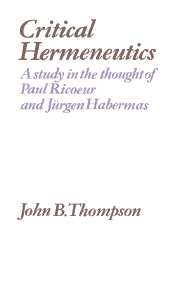Book contents
- Frontmatter
- Contents
- Foreword by Anthony Giddens
- Preface
- Introduction
- Part I Thematic exposition
- 1 Ludwig Wittgenstein and ordinary language philosophy
- 2 Paul Ricoeur and hermeneutic phenomenology
- 3 Jürgen Habermas and critical social theory
- Part II Constructive critique
- Conclusion
- Notes
- Select bibliography
- Index
3 - Jürgen Habermas and critical social theory
Published online by Cambridge University Press: 10 December 2009
- Frontmatter
- Contents
- Foreword by Anthony Giddens
- Preface
- Introduction
- Part I Thematic exposition
- 1 Ludwig Wittgenstein and ordinary language philosophy
- 2 Paul Ricoeur and hermeneutic phenomenology
- 3 Jürgen Habermas and critical social theory
- Part II Constructive critique
- Conclusion
- Notes
- Select bibliography
- Index
Summary
Critical social theory marks a distinctive standpoint in the contemporary philosophical field. This standpoint is part of a tradition of thought which stems from the writings of Kant, Hegel and Marx, and which includes the contributions of the Frankfurt Institute for Social Research. The work of Jurgen Habermas represents an original development of several themes which preoccupied the critical theorists of the Frankfurt School. The specific nature of this development has appeared in the course of a brief but prolific career, during which Habermas has written on topics ranging from classical philosophy and student politics to the theory of social evolution. Accordingly, in the pages that follow, I attempt to sketch some of the themes of critical social theory through a selective exegesis of the work of Habermas. One consequence of this approach is that the writings of other authors who are commonly associated with the standpoint of critical theory are only cursorily discussed. Moreover, since Habermas has expressed his views on an astonishing variety of issues, and since with each new publication these views continue to be elaborated and reformed, no claim can be made to provide a comprehensive and conclusive account of his work. Nevertheless, and despite these limitations, this chapter is animated by the belief that a selective exegesis of the writings of Habermas will provide a suitable basis for the analysis of certain themes in critical social theory.
- Type
- Chapter
- Information
- Critical HermeneuticsA Study in the Thought of Paul Ricoeur and Jürgen Habermas, pp. 71 - 112Publisher: Cambridge University PressPrint publication year: 1981



